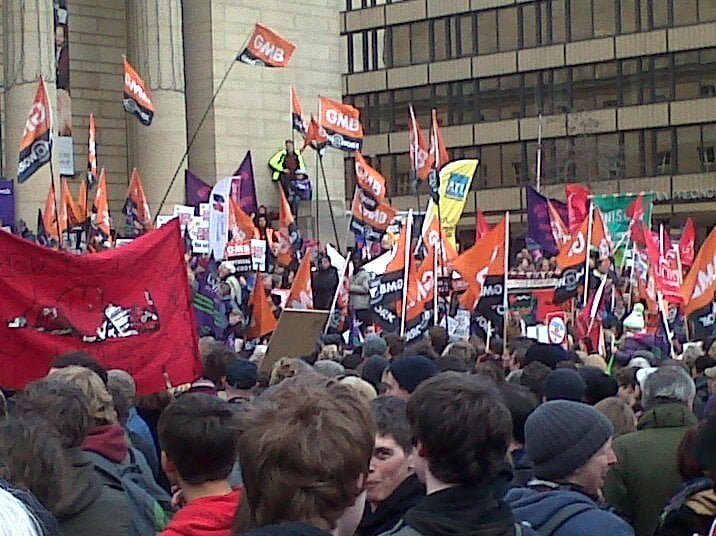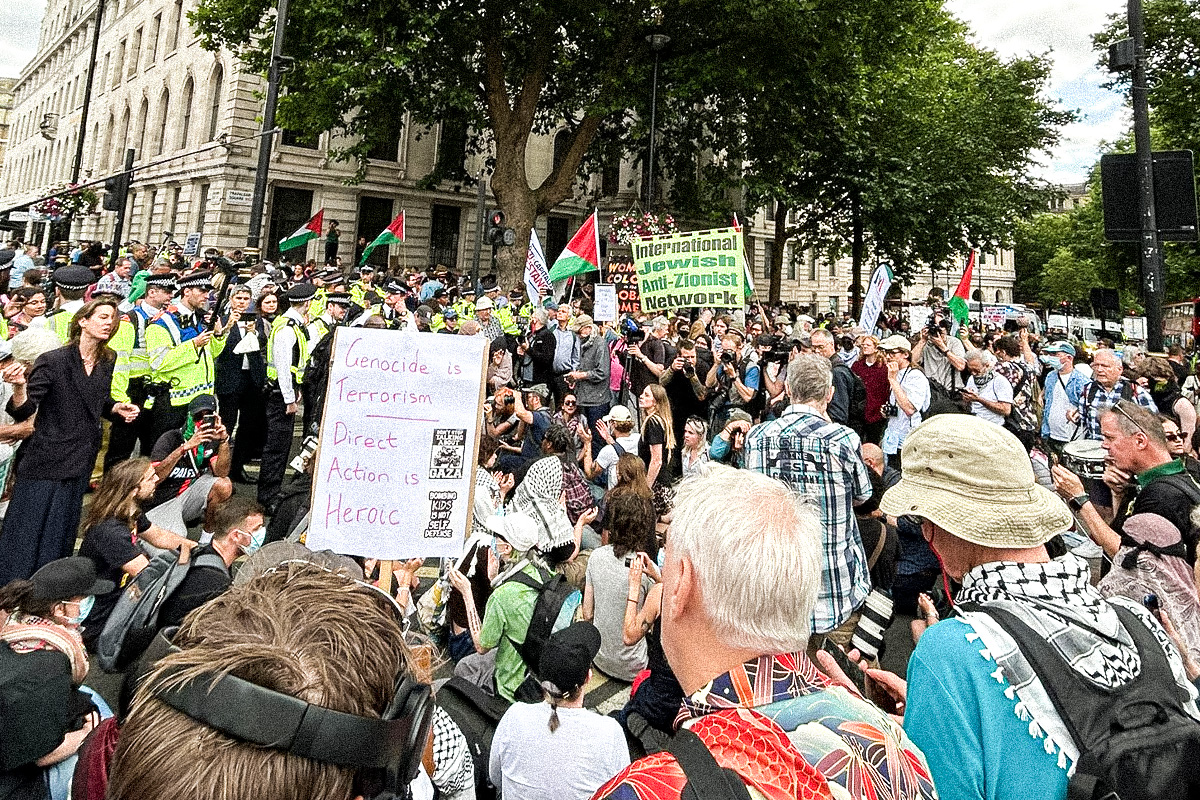Working people are facing the biggest attack on their living standards
for generations. They are being presented with a bill for a crisis not
of their making. In the meantime, millionaire bankers and financiers
have gotten away with murder.
Working people are facing the biggest attack on their living standards for generations. They are being presented with a bill for a crisis not of their making. In the meantime, millionaire bankers and financiers have gotten away with murder.
They received billions in public handouts at the same time as avoided paying billions in income tax. Sir Fred Goodwin, former head of the now nationalized Royal Bank of Scotland, walked away with a pension pot of £16.3 million, an annual pension of £342,500 plus a £2.7m tax-free lump sum. How many nurses’ or dinner ladies’ pensions is this man really worth?
The aim of the government’s austerity programme is to slash wages, conditions and jobs. They have imposed a wage freeze as prices rocket, which means a cut in real wages. Rates for overtime or unsocial hours have also been cut. Now the government is planning to sack 650,000 public sector workers, with a similar figure to go in the private sector, as unemployment reaches more than 2.6 million and rising.
The Coalition is using the Hutton Report to cut pensions, because “we are all living longer”. How unfortunate! Workers are now being asked to work longer, pay more in and receive less in retirement. In effect, workers are being asked to work until they die. This at a time when there are 2.5 million pensioners living in poverty in Britain today. These proposed cuts in pensions will affect generations to come.
Why should ordinary people suffer for a crisis caused primarily by bankers and financiers in the City of London? It is their actions and their system that is responsible.
The response to these austerity attacks was the magnificent Day of Action on 30 November, which involved over two million public sector workers in strike action. It was the biggest strike in numbers since 1926. At last, workers were getting up from their knees.
Unfortunately, a number of trade union leaders saw the strike as simply a bargaining chip in their negotiations with the government. They want an “honorable settlement” without unnecessary strife. That is why they are opposed to further industrial action. “We and the unions agree that this is the best outcome that can be achieved by negotiation,” stated Danny Alexander, chief secretary to the Treasury, and Liberal Democratic who hopes one day to grow up to become a Tory!
The government has made certain “concessions,” including some limited “consultation.” But this is merely window dressing containing very little real change. Danny Alexander had made it plain that the over-all cost of the government’s proposals will remain the same. There will be no new money. According to him, the only concessions made to the unions were “technical” ones. In other words, any technical concession here will be paid for by technical concessions there. “All these heads of agreement are within the cost ceiling I set out in November, but in a configuration preferred by the Unions,” explained Alexander to Parliament. All the unions managed to achieve was a “configuration”!
Not the case
This still means a 3.2% tax on workers, who will receive less pension and work much longer. Unfortunately, some union leaders have hailed these “concessions” as a “breakthrough.” But this is not the case. Others were tight-lipped but inwardly very pleased, having signed the “heads of agreement” and accepted the principles of the deal.
At last, now they had something they could sell to the members, despite the threadbare concessions. Unison’s head of health, Christina McAnea, stated that “we have made progress”, but then added, “we always knew this would be a damage limitation exercise aimed at reducing the worst impacts of the government’s pension changes." It is clear they had no faith in their arguments or in themselves.
The unions were given until 31 December to sign an agreement. The government was in effect holding a gun to their heads. But this is no time to give into blackmail or to buckle. The problem is, weakness invites aggression. If you go into negotiations already waving a white flag, then you will come out with nothing or next to nothing. The union leaders hope that such mealy-mouthed “concessions” will be enough to sell to their members. But this is a sham deal, no more no less.
Some unions, like Prospect, have now ruled out industrial action while negotiations are continuing. Other unions, like Unison, will take the “final offer” to their executives or group committees to decide whether to accept, reject or consult their members.
The PCS union has correctly come out against the agreement. There was nothing new on offer. The PCS general secretary, Mark Serwotka, urged unions to fight the proposed changes: "We should call further industrial action in the new year because this is so unfair, we have got to stand up against it. We are going to go and hear what the other unions have got to say. Our message really is that those unions will have to be accountable to their members for what they do. We all came out together."
This stand by PCS has met with the announcement by the Cabinet Office that the PCS would no longer be invited to further discussions. Significantly UNITE the Union, UCU, some teachers unions and the Prison Officers Association have also refused to endorse the deal.
Nevertheless, behind the scenes the government is cock-a-hoop at the reaction to the “deal” by many of the trade union leaders, who are looking for a quiet life.
Unfortunately, this has served to cause divisions within the unions, with the moderate ones, including the TUC, looking for a quick way out. This was the government’s plan all along.
Looking delighted with himself, Brendan Barber TUC general secretary, sounded ever-more like Dickens’ Uriah Heap, desperately hoping for something to come up: "We have been talking for many months but since the day of action that involved millions, and with the intensive discussions over recent days, we now see change.” He continued, “Accrual rates are more favourable than were originally proposed, there is enhanced protection for those nearing retirement, Fair Deal protection for those whose jobs transfer out of the public sector, and there will be no adverse changes to pensions for 25 years."
Those rushing to accept the deal are squandering the solidarity built up over the 30th November Day of Action. Some 29 trade unions came together in a united front. Now the front is threatened by divisions.
Brian Strutton, national secretary for the GMB, hailed a “major step forward” in negotiations but added significantly, “No-one should underestimate the difficulties of finishing off the detail and then getting it approved by health workers out there.”
Anger
Here is the rub. Clearly, there will be real anger in the rank and file over this deal. Selling the deal will not be easy. The trade union leaders need to be put under pressure with the demand “no surrender.” They were elected to represent their members and not make rotten deals with the government that will undermine terms and conditions. If they cannot stand the heat, they should get out of the kitchen.
In the period opening up, we need fighting trade unions, accountable to the rank and file.
This fight over pensions is not the last fight that confronts the working class. There will be many battles to be fought as the Coalition seeks to impose its austerity programme.
The Coalition will be encouraged by this display of weakness by the union leaders. This will only encourage them to strengthen their resolve to make the workers pay.
The government now realises that its austerity targets have slipped due to the stagnation of the economy. They need to make more cuts than were planned in March. They need to make up for an annual shortfall of £22bn and therefore need to wield the axe far deeper. These extra “savings” will come from sackings and closures, wage cuts and forcing people to work for longer.
However, in this period of capitalist crisis, the unions cannot play a mediating role as in the past. The working class has no alternative but to struggle. That is why the trade unions need to return to their original role as fighting organisations. That is why we need leaders who are not prepared to compromise, but will put themselves firmly on the side of working people.
For the working class, under conditions of capitalist crisis, it is a race to the bottom. The system cannot any longer afford lasting reforms. In its decline, it promises only years of austerity.
That is why the trade unions should put themselves at the forefront, along with the Labour Party – which they created, in the struggle to change society. Not by hoping to reform capitalism, but to do away with it altogether. This means transforming the mass organisations into organs of socialist struggle.
This is the real lesson of the present fight.
- No to the pensions deal
- Prepare for further industrial action!
- For fighting militant trade unions!
- No to the austerity cuts
- Down with the ConDem Coalition
- For a real Labour government committed to socialist policies, including the nationalisation of the banks and the big corporations.
- For a socialist planned economy as opposed to the anarchy of the market!






